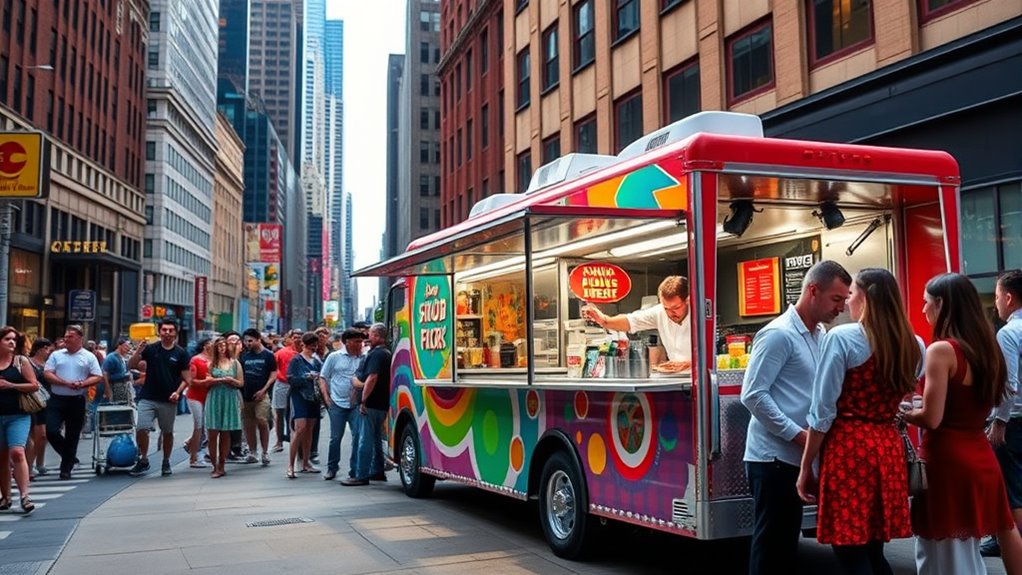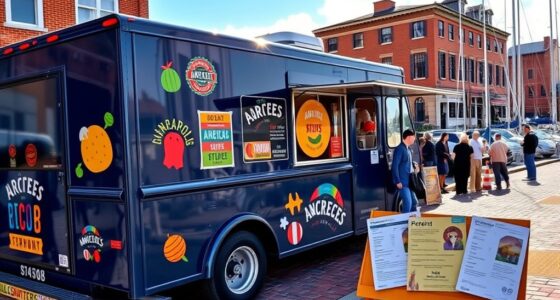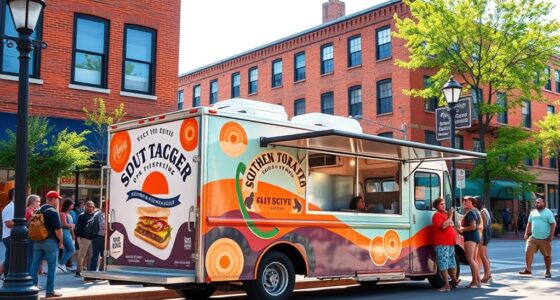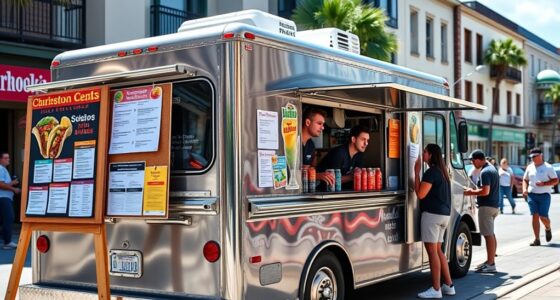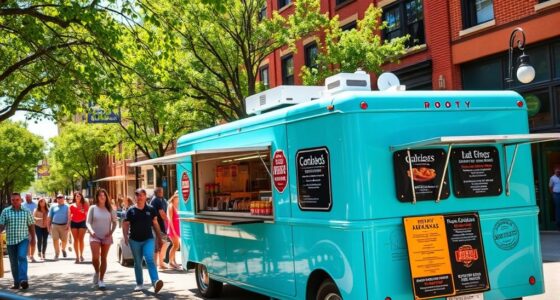To open a food truck in NYC, you’ll need permits like a Mobile Food Vendor License, health permits, and fire safety certificates, with costs around $700–$2,100. You should budget for trucks costing $30K–$175K and find high-traffic locations such as busy districts or event sites. Develop a diverse menu inspired by NYC’s multicultural tastes, and design smart marketing strategies. If you keep exploring, you’ll uncover how to navigate all these steps successfully.
Key Takeaways
- Obtain necessary permits including Mobile Food Vendor License, health department permits, and fire safety certificates before launching.
- Budget for vehicle costs (used $30K–$100K, new $50K–$175K), equipment, licensing fees, and commissary agreements.
- Choose high-traffic locations like transit hubs, nightlife districts, and tourist spots, considering licensing costs and competition.
- Develop a culturally diverse, seasonal menu with quick, portable options inspired by NYC’s multicultural demographics.
- Use targeted marketing, social media, and event partnerships to attract customers and streamline operations for efficiency.
Navigating NYC Food Truck Permitting and Licensing Requirements
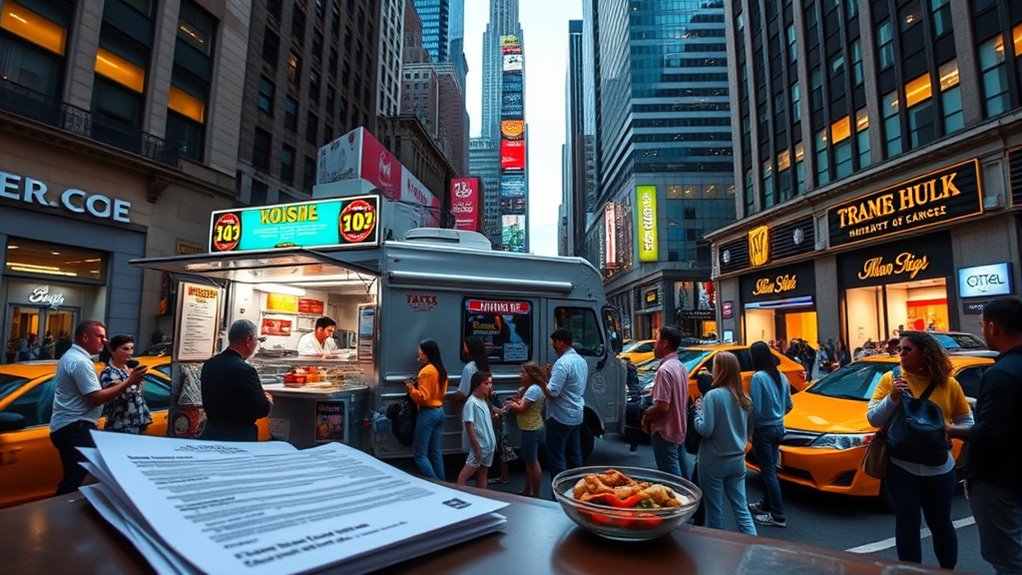
Mastering NYC food truck permitting and licensing requirements can seem complex, but understanding the key steps makes the process manageable. First, you need a Mobile Food Vendor License, which requires passing the Food Protection Course for Mobile Vendors, costing around $53. You’ll also need a Business License to register your truck with New York State, with annual renewals and documents like proof of identity, a registered business name, and an EIN. A Health Department Permit is essential to meet food safety standards, along with Food Handler’s Permits for staff. If you’re cooking on-site, fire safety certificates are mandatory, ensuring proper gas line installation and fire suppression. Additionally, staying compliant with relationships – personality test standards can help maintain a positive environment for your staff and customers. Ultimately, a Commissary Letter of Agreement verifies use of an approved commercial kitchen, which is indispensable for compliance. Preparing these permits and licenses upfront streamlines your NYC food truck journey. Having all required permits in place minimizes delays and helps you operate smoothly within city regulations.
Estimating Startup and Operational Expenses for Your Food Truck
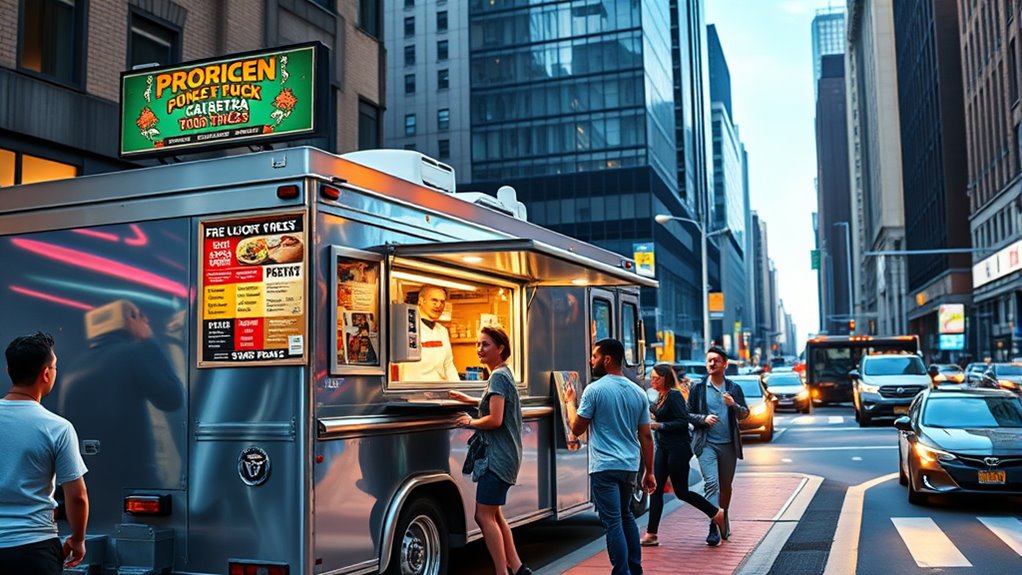
Estimating your food truck expenses involves understanding costs for permits, equipment, and daily operations. You’ll need to account for vehicle purchase or rental, kitchen gear, and licensing fees specific to NYC. Planning your budget carefully helps guarantee you’re prepared for both startup investments and ongoing costs. Additionally, it’s important to consider the cost of permits and licenses, which can range from $700 to $2,100, to ensure full compliance with local regulations. Being aware of Fokos can also help you stay informed about relevant policies and updates impacting your food truck venture.
Permit and Licensing Fees
Wondering what it costs to legally operate a food truck in NYC? Permit and licensing fees are a key part of your startup costs. Mobile food vendor permits are limited and awarded through a lottery, with prices exceeding $2,000 on the black market. Official permits cost about $200 to $300 for a two-year term. You’ll also need a health department license, which starts around $280 annually, plus a Food Protection Certificate costing roughly $114. Business licenses can range from $50 to $500, with vehicle registration adding approximately $400 yearly. Insurance costs typically fall between $2,000 and $4,000 annually, and fire safety permits are about $70. Remember, permits must be renewed regularly, and inspections are mandatory to stay compliant.
Vehicle Equipment Costs
Understanding your vehicle equipment costs is essential for accurately budgeting your food truck startup. Used trucks in NYC typically range from $30,000 to $100,000, depending on condition and upgrades, while new trucks cost between $50,000 and $175,000 fully equipped. Customizing or retrofitting a used truck to meet NYC standards can add significant expenses. Building from chassis plus kitchen equipment may cost $85,000 to $115,000. Renting a truck for six months might cost $2,000 to $3,000 monthly, offering a lower upfront option. Essential kitchen appliances like griddles, fryers, and broilers can range from $1,500 to over $6,000 each. Safety systems, ventilation, and branding add thousands more. These investments assure your truck is compliant, functional, and ready to serve your menu. Proper budgeting and planning Kia Tuning are crucial to avoid unexpected costs and ensure a smooth launch.
Operational Expense Planning
Planning your food truck’s expenses starts with a clear picture of both startup and ongoing costs. You’ll need to budget for permits, licenses, and inspections, which can cost between $28,000 and $30,000 in NYC’s competitive environment. Expect to pay monthly rent for a commissary kitchen, ranging from $800 to $2,500, and annual waste disposal fees from $600 to $1,500. Initial inventory costs typically fall between $2,000 and $4,600, depending on your menu complexity. Don’t forget insurance premiums around $1,000 or more annually, plus vehicle maintenance and fuel costs. Your marketing budget should be about 12-20% of projected revenue, with initial branding expenses of $3,000 to $5,000, including truck wraps and promotional campaigns. Ongoing operating expenses, such as payroll, supplies, and fuel, will also need to be factored into your overall budget to ensure smooth daily operations.
Choosing Prime Locations to Maximize Customer Foot Traffic

Choosing the right location is essential for maximizing customer foot traffic and boosting sales for your food truck in NYC. High-traffic areas like near Central Park command premium licenses, sometimes exceeding $200,000 annually, reflecting their popularity. Busy transit hubs and commuter centers offer excellent visibility and access, attracting large crowds daily. Nightlife districts in Manhattan and Brooklyn see late-night surges, ideal for late-hour vending. Tourist hotspots like Times Square and Lower Manhattan draw steady daytime and evening crowds, while business districts provide prime lunch spots for office workers. Keep in mind, licensing costs vary by location, and seasonal changes impact customer flow—summer months usually boost sales, winter can slow down. Balancing high license fees with expected foot traffic is key to choosing profitable spots. The number of active food trucks in NYC fluctuates but remains high, making competition fierce in prime locations and requiring strategic planning.
Crafting a Menu That Appeals to NYC’s Diverse Palate
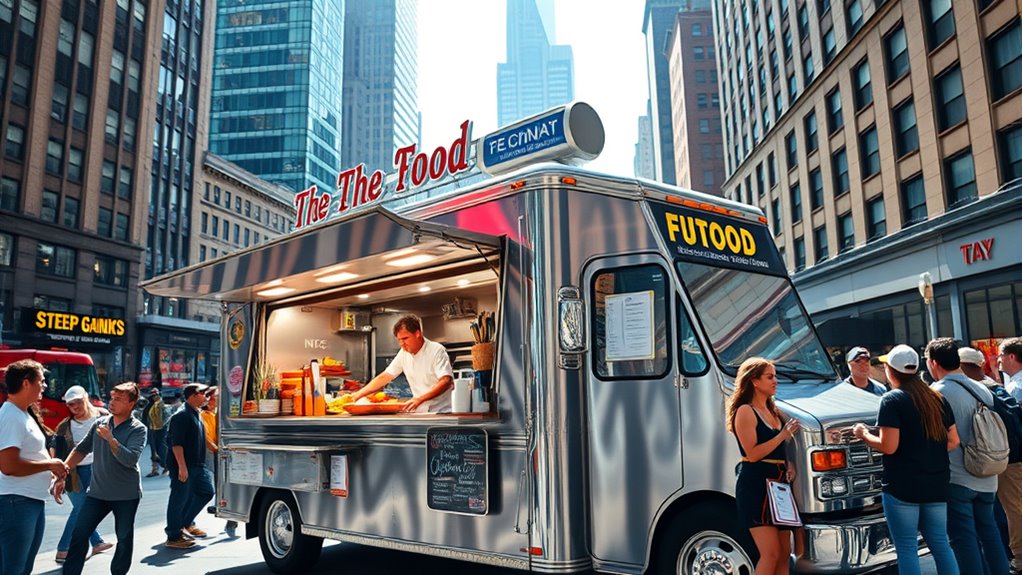
To succeed in NYC, you need a menu that reflects its rich cultural diversity and offers quick, convenient options for busy customers. Incorporate seasonal ingredients to keep dishes fresh and exciting while showcasing local and global flavors that appeal to a wide audience. By balancing these elements, you’ll create a menu that resonates with the city’s dynamic, health-conscious, and fast-paced food scene. Additionally, embracing bold flavor pairings can help your offerings stand out and cater to the adventurous palates of many New Yorkers. Using ingredients that provide hydration and nourishment can also enhance the appeal of your dishes, aligning with the diverse dietary preferences in the city.
Embrace Cultural Diversity
Embracing cultural diversity in your NYC food truck menu is essential to attract a broad and loyal customer base. With operators from over 60 countries, you can reflect global influences by offering authentic dishes. Incorporate flavors from major origins like Mexico, Ecuador, Egypt, and Senegal, creating a vibrant menu that celebrates heritage. Highlight popular cuisines such as tacos, empanadas, Middle Eastern stews, and African grilled skewers to entice diverse tastes. Think about:
- Bright, colorful tacos filled with spicy salsas and fresh toppings
- Aromatic, slow-cooked stews from North Africa served with flatbread
- Crispy empanadas bursting with savory fillings from Latin America
- Fragrant, herb-infused dishes inspired by Middle Eastern markets approximately 23,000 vendors operate in NYC, providing a wide variety of options for your menu. Incorporating cultural influences can help your offerings stand out and resonate with a diverse customer base.
Focus on Convenience and Speed
In NYC’s fast-paced environment, your food truck needs to prioritize quick preparation and efficient service to attract busy customers. Focus on menu items that are easy to assemble, like handheld bites and bowl meals, using pre-prepped ingredients to cut wait times without sacrificing quality. Modular cooking stations can prepare multiple orders simultaneously, speeding up service. Use tech tools like AI-powered POS systems and contactless payments to streamline orders and reduce lines. Emphasize portable, easy-to-eat options such as tacos, wraps, sliders, and bowls that customers can eat on the go or during short breaks. Keep your menu simple with 5–8 core items inspired by popular international flavors, allowing quick decision-making and fresh ingredients. Balancing flavor variety with streamlined choices helps you serve diverse tastes efficiently. Additionally, market research can help identify the most in-demand dishes and flavor profiles in different neighborhoods, ensuring your menu appeals to a broad customer base.
Incorporate Seasonal Ingredients
Incorporating seasonal ingredients into your NYC food truck menu not only boosts freshness but also appeals to the city’s diverse palate. You can highlight the best flavors of each season by sourcing produce at peak times, ensuring top quality and taste. For spring, think tender asparagus, leafy greens, and ramps that add brightness to your dishes. Summer offers ripe tomatoes, sweet corn, and juicy peaches for vibrant meals. Fall brings hearty squash, apples, and root vegetables perfect for warming comfort food. Winter ingredients like hearty greens and seasonal herbs help create rich, satisfying options. Seasonal produce also allows you to showcase local farms and support sustainable practices, which can resonate well with environmentally conscious customers. Additionally, understanding color accuracy in ingredients ensures your dishes look as appealing as they taste, enticing customers to try seasonal specials.
- Visualize fresh, colorful salads topped with local herbs
- Imagine sizzling summer corn with a dash of spice
- Picture hearty fall stews with seasonal root vegetables
- Envision bright, fruit-infused beverages using orchard-fresh produce
Effective Marketing and Customer Engagement Strategies
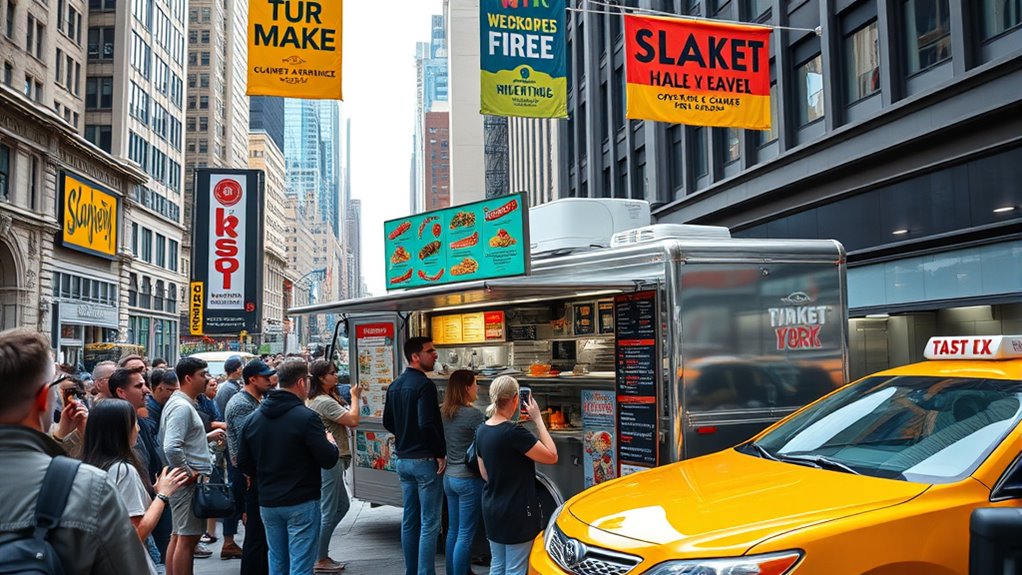
To stand out in NYC’s competitive food truck scene, you need to implement targeted marketing and engagement strategies that connect directly with your customers. Leverage location data and foot traffic insights to choose high-traffic sites and optimize stock, reducing costs and increasing sales. Use real-time mobility patterns to time your promotions and stock updates during peak hours. Offer creative promotions like free samples, flash sales, or buy-one-get-one deals to generate buzz and attract first-time visitors. Maintain an active social media presence, using targeted hashtags and geotags to reach millennials and Gen Z. Partner with local events and festivals to increase visibility and gather customer data for personalized marketing. Align your messaging with local preferences and values like sustainability, emphasizing your unique offerings to build loyalty and boost engagement. Incorporating principles of yoga such as mindfulness and balance can also help you develop a more authentic brand identity that resonates with health-conscious consumers.
Best Practices for Operations and Regulatory Compliance

Staying compliant with NYC’s strict regulations is essential for the smooth operation of your food truck. You must obtain a Mobile Food Vendor License from the NYC Health Department before starting, or risk immediate shutdowns. Register your truck as a commercial vehicle with the DMV and keep emissions and weight standards in check. Display your permits visibly, including letter grade decals, and regularly renew them at designated centers. Maintain a valid commissary agreement for cleaning and storage, updating the Health Department within 10 days of any changes.
- Keep permits and licenses visible and updated on your truck
- Conduct daily checks for cleanliness, equipment, and permit display
- Store your truck securely at approved commissaries when not in use
- Train staff on hygiene, safety, and health standards
- Be aware of regional divorce statistics that highlight the importance of legal preparedness and proper documentation, which can be crucial if legal issues arise during your business operations.
Leveraging City Programs and Events to Expand Your Reach
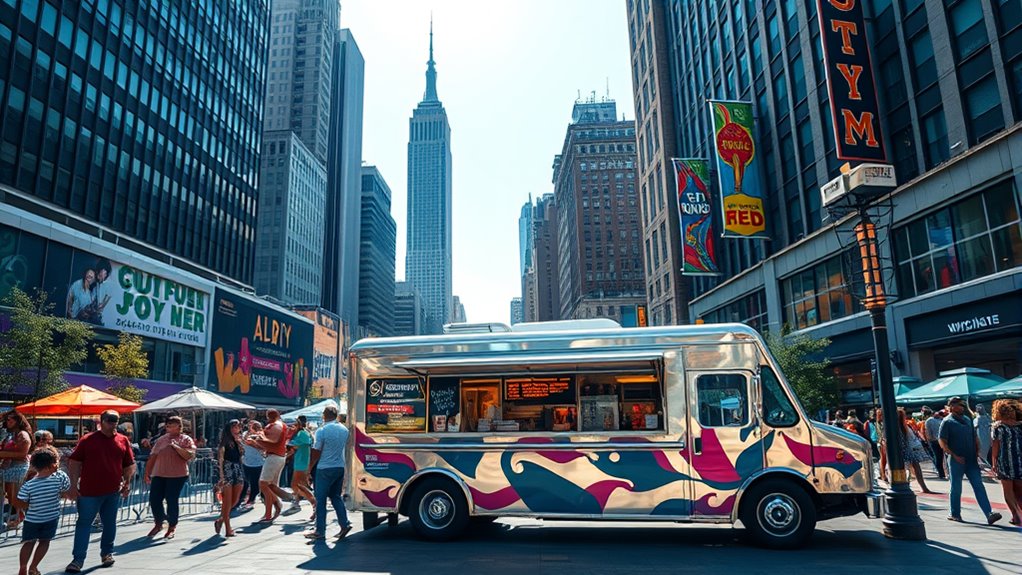
Leveraging city programs and events offers a powerful way to boost your food truck’s visibility and attract new customers. Participating in major festivals like Smorgasburg exposes your truck to tens of thousands of visitors weekly, creating valuable brand awareness and sales opportunities. These events also foster networking, helping you connect with other vendors and expand your operations. City-supported festivals in Staten Island, Mineola, and Astor Place often feature live entertainment and attractions that draw diverse crowds, increasing your reach. Collaborating on special events, such as product sampling or branded activations, enhances customer engagement and loyalty. Additionally, incorporating detoxifying juices into your menu can attract health-conscious customers and differentiate your truck in a competitive market. Plus, city-run events usually have straightforward application processes, making it easier to get involved and grow your presence within the local community.
Frequently Asked Questions
How Long Does It Typically Take to Obtain All Necessary Permits?
The current question asks how long it takes to get all necessary permits. You should expect a process that can take several months up to a year, depending on factors like waiting lists, permit categories, and location. You’ll need to complete required training, gather documentation, and pass inspections. Staying proactive and monitoring application status can help you navigate delays and speed up the process.
Are There Restrictions on Operating Hours for NYC Food Trucks?
Think of NYC’s vending hours like a carefully choreographed dance—each step regulated for safety and order. You’re restricted by specific time windows based on location, typically between 7 am and 2 am, with some streets banning vending during certain hours. Violating these rules can lead to fines or permit issues. Always check your exact location’s limits and stay compliant to keep your food truck running smoothly.
What Are the Most Cost-Effective Ways to Retrofit a Food Truck?
To retrofit a food truck cost-effectively, you should start by choosing a vehicle with some existing kitchen features, reducing renovation needs. Opt for used or refurbished appliances, and prioritize essential equipment first, adding upgrades later. Consider phased retrofitting to spread costs and source materials locally or secondhand. Also, consult NYC health and fire officials early to guarantee compliance, avoiding costly rework and delays during your startup process.
How Can I Best Target Specific NYC Neighborhoods for My Food Truck?
Did you know that neighborhoods with high foot traffic, like Manhattan and Queens, see up to 60% more food vendor sales? To target NYC neighborhoods effectively, analyze local demographics and cultural makeup to tailor your menu and signage. Engage with community events, partner with local organizations, and use geo-targeted social media ads. Focus on underserved micro-locations and peak hours to maximize visibility and attract loyal customers.
What Are Common Challenges Faced When Complying With NYC Health Regulations?
You’ll face several challenges complying with NYC health regulations. You need to secure permits, like the Mobile Food Vendor Permit and Food Protection Certificates, which can be costly and time-consuming. Inspections are strict, and violations lead to hefty fines or shutdowns. Finding a compliant commissary is tough, and strict location rules limit where you can operate. Staying on top of these regulations requires constant vigilance to avoid penalties and keep your truck running smoothly.
Conclusion
Starting a food truck in NYC is like planting a seed in a bustling garden—you’ll need the right permits, a tasty menu, and strategic locations to grow. Stay disciplined with your costs and engage your customers through smart marketing. By steering regulations smoothly and seizing city events, you’ll nurture your business into a thriving bloom amid the city’s vibrant landscape. With dedication, your food truck can flourish in this dynamic urban ecosystem.
